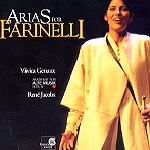You may remember that movie a few years back about the legendary castrato Farinelli. The voice used in the film was an artificial composite of two real voices, the idea being to make it sound somehow otherworldly, as we might imagine a true castrato would have sounded. But when you have voices around such as the one possessed by Vivica Genaux, all that fussing with digital fakery registers as just so much foolishness. American mezzo-soprano Genaux has a voice and technique that certainly are otherworldly–in the best imaginable sense–but she’s also definitely rooted in flesh-and-blood reality. Get ready, voice fans–this is an amazing CD, and these performances set the standard by which all future interpreters of this repertoire will be measured.
You can use all the clichés and vocal technical terms that describe greatness–dazzling, daring, fluid, focused, seamless, fearless, tonal consistency and accuracy of pitch across registers, etc.–and they all apply. Although countertenors have typically claimed the territory represented by these florid and challenging 18th-century arias, Genaux, with her astounding agility, vivid color, and solid, sustained power that underlies every note, ornament, and run from top to bottom, shows why this material actually sits and feels better in the command of a mezzo–admittedly a very special one! Her stamina alone is remarkable as she simply vanquishes one 8- or 10-minute aria after another. Through all the notes–and there probably are more notes per second of music here than on any other vocal disc ever made!–she maintains interpretive sense and expressive composure.
Sure this music is for show, but it also needs unfailing attention to technique and a believable dramatic foundation. Again, Genaux doesn’t disappoint. Only in the super-human speed of her rendition of Riccardo Broschi’s “Qual guerriero in campo armato” (from Idaspe) do we sense that perhaps a little moderation would have been kinder–not only to Genaux but to us listeners as well (“Is she going to make it?”). Among the nearly continuous “highlights” are some really lovely singing in Porpora’s Polifemo aria, with exquisitely turned and trilled ornaments, and one section of Hasse’s “Or la nube procellosa” that shows singer and orchestra in stunning, perfectly judged imitative ornamental effects. And what deliciously rich tones Genaux produces in her lower register in the following aria from Hasse’s Artaserse!
René Jacobs is a superb accompanist and his orchestra is a marvel of ensemble precision, gorgeous tone, and when required, scintillating energy to match Genaux’s. The sound couldn’t be better, and the whole irresistible package is completed with thoughtful, informative notes on castrati in general, Farinelli in particular, and on the music and performers. Listeners should note that the final aria–an absolutely jaw-dropping display of vocal artistry–begins with a recitative that’s not included in the printed texts. What else can I say, except that hearing is believing? [7/13/2002]
































